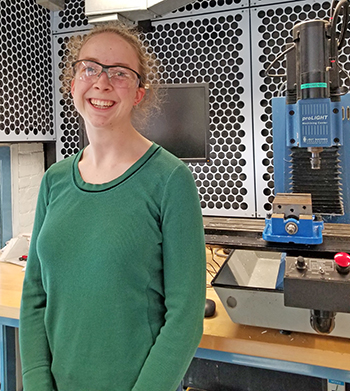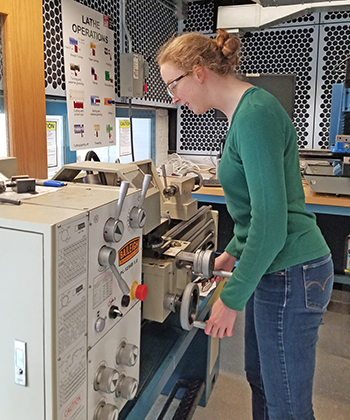 Follow along as Lyra Wanzer builds an electroadhesive treaded robot for her senior capstone project
Follow along as Lyra Wanzer builds an electroadhesive treaded robot for her senior capstone project
Lyra Wanzer, S.B. ‘19, concentrating in mechanical engineering at the Harvard John A. Paulson School of Engineering and Applied Sciences, is working on an electroadhesive treaded robot in the Microrobotics Laboratory of Robert Wood, Charles River Professor of Engineering and Applied Sciences, for her project in “Engineering Design Projects” (ES 100). The capstone course challenges seniors to develop a creative project that solves a real-world engineering problem.
In the beginning of the school year, Wanzer developed the concept for her project. Over halfway through, Wanzer has worked on five iterations of her robot, making major changes and testing new ideas each time. She has encountered a variety of challenges, such as when the wheels of her robot were misaligned. This led to friction between the treads and the wheels, jamming the treads of her robot.To overcome this challenge, she made another iteration with perfectly concentric wheels that were directly perpendicular to the shaft so that the treads would move more easily around them.
“It’s fun to have a project that you know so deeply about and know how all the sub-systems work,” she said.
Throughout the fine-tuning process, Wanzer has tweaked dimensions and made different prototypes to figure out the best way to tension the treads of her robot. She found that it was incredibly important to be open to unlikely ideas and test them with a quickly made prototype.
She advises students interested in thesising to plan time for iterations and to have fun with their project. Wanzer recommends talking to people in the lab and the Active Learning Labs because, as she said, “You’d be surprised at the random and very good ideas people have.”
Wanzer meets with her lab every week to give updates on her project and brainstorm.
“We’re  all very excited about the project, which makes it even more fun to work on,” she said. “I’m really lucky because I found a project that I’m really interested in. It keeps my motivation up, which is super important.”
all very excited about the project, which makes it even more fun to work on,” she said. “I’m really lucky because I found a project that I’m really interested in. It keeps my motivation up, which is super important.”
Wanzer has found thesising to be very rewarding because, while in class you have a defined answer to arrive at, with a thesis you need to try a lot of different ideas to determine the best path forward. Her next step will be testing the robot’s electroadhesion by applying high voltages to the electroadhesive treads and seeing how the robot adheres to conductive surfaces.